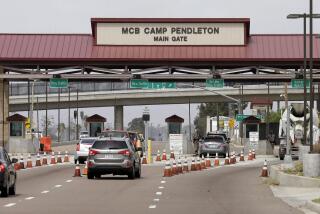Wife Pleads Marine’s Case in Okinawa Rape Trial : Justice: Spouse says her husband, accused in brutal attack on schoolgirl, is a gentle and intelligent man.
- Share via
TOKYO — Three U.S. servicemen accused of raping an Okinawa schoolgirl were painted as stellar soldiers, and one as a loving husband, as defense attorneys Monday sought to soften the men’s violent image in a case that has outraged Japan.
Marine Pfc. Rodrico Harp, 21, buried his head in his hands and wept as his wife, Denitrease, apologized for the crime and told the court her husband is a gentle, intelligent man who “adored” his two children.
“I’m very sorry,” she said, before breaking down in sobs. “I’d like to apologize to the Japanese girl, to her mother and father, to the people of Japan and the United States.”
In the second hearing in the high-profile case, U.S. military officers testified on behalf of the other two suspects, Navy Seaman Marcus Gill, 22, and Marine Pfc. Kendrick Ledet, 20, saying they were good soldiers who performed their military duties well.
The three men are accused of abducting a 12-year-old girl off the streets of Naha on the southern island of Okinawa and taking her to a remote sugar cane field. There, prosecutors allege, they brutally beat and raped her after tying her up with duct tape and rope.
Gill has pleaded guilty to rape; Harp and Ledet deny raping the girl but have admitted assisting in the Sept. 4 crime. The men face sentences ranging from three years to life imprisonment.
The case has ignited the fiercest protests against the U.S. military here in more than three decades, drawn apologies from U.S. officials, including President Clinton, and led to pledges to consolidate bases and improve discipline among the 44,000 U.S. military personnel in Japan. Bowing to the public uproar, the United States also agreed to give the Japanese early custody of military suspects in cases of rape and murder.
Denitrease Harp’s apology in the Naha District Court and pledges by the suspects’ families to pay $14,850 in compensation to the girl appear to represent a new defense strategy to show hansei --the remorse and self-reflection considered necessary to gain shorter prison sentences here. The families initially claimed that Japanese officials had discriminated against the men, who are African American, and coerced confessions from them.
Those remarks, made in an Atlanta news conference Nov. 7, were widely reported in Japan, further inflaming the public here.
Eric Ross, a U.S. attorney retained by the families who accompanied them to Okinawa, told Kyodo News Service that the families had “misunderstood” the situation because they lacked information and are now satisfied that racism did not play a part in the men’s arrest and indictment.
Ross also said Japanese prosecutors obtain confessions in most criminal cases and win convictions more than 99% of the time, so the defense team’s primary goal now is to mitigate the sentences.
The confessions of the three men, however, were obtained without the presence of an attorney--a sharp difference between the U.S. and Japanese systems of justice that is at issue in current negotiations over changing criminal procedures. Currently, U.S. military suspects are handed to Japanese authorities after indictment, but the two sides recently agreed in principle that such transfers can be done after arrest in certain heinous crimes.
While the men have backed down on charges of coerced confessions by the Japanese, Harp told the court on Monday that U.S. military police forced him to falsely say he raped the girl. He said he was awakened at 4 a.m. two days after the incident and pressured to say “what the Japanese would like to hear,” the Associated Press quoted him as saying.
“When I told them what did happen, they pressured me to go in another direction,” Harp told the court.
Later, however, Harp denied to Japanese police that he had raped the girl. Prosecutors are not expected to use the statement he made to U.S. military authorities.
Ross said Monday’s testimony has begun to balance the image of the men, who have been castigated as “military devils” and “animals” here. “People will know now that they are not stark raving animals, as they have been described by certain individuals,” Ross said.
The next hearing is scheduled for Monday.
More to Read
Sign up for Essential California
The most important California stories and recommendations in your inbox every morning.
You may occasionally receive promotional content from the Los Angeles Times.














